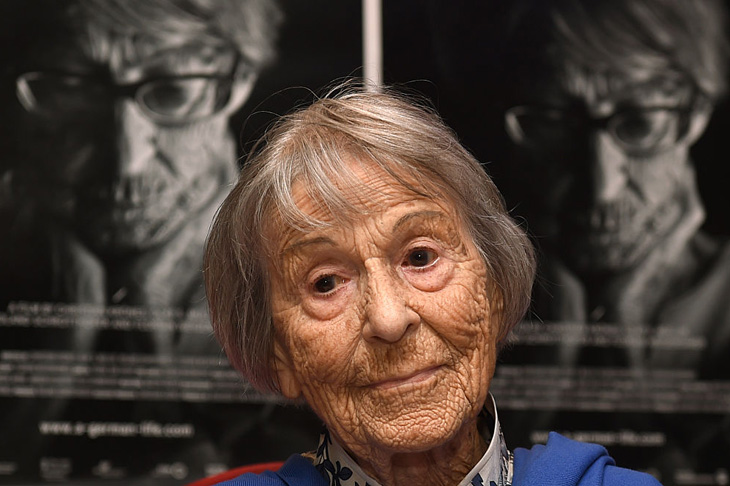As if on cue, The World At One on Monday (Radio 4) ended with a short (too short) interview with an Austrian documentary film-maker who recently made a film about Brunhilde Pomsel, secretary to Hitler’s propaganda minister, Joseph Goebbels. The announcement of her death in Munich, aged 106, prompted the conversation, which happened to follow all the stories about the repercussions of President Trump’s executive order banning those from certain countries from entering the US. The significance was not lost on the ever-astute Martha Kearney.
Florian Weigensamer described Pomsel in great age as ‘just incredible’. She was ‘quick-witted, funny, a great storyteller’. But, said Kearney, ‘She was working at the heart of the Nazi machine, wasn’t she?’
‘She was not one of those avid Nazis,’ replied Weigensamer. ‘She was just one of those millions of followers that the system was built on…’
He went on to explain, ‘She ended up working for one of the worst criminals in history just because she always looked the other way, and just because she was looking for her own advantage, and just because she always led a very selfish life. Not because she was a very political person… She always maintained that she had no idea what was going on.’
Of course, it was important to take into account her age at the time of the film. Memory cannot always be trusted. But Weigensamer pointed out how Pomsel claimed to have known nothing about Kristallnacht, yet at the same time she did recall how on that night in November 1938 the shop next door, owned by Jews, had been destroyed. And that her close friend, also Jewish, just disappeared. Did she ever try to find out what had happened to her? No.
Perhaps the interview resonated so powerfully because of the social-media atmosphere that is currently being stoked by events. Yet what struck me afterwards were the words Weigensamer had chosen to describe Pomsel and what she had done. He was so matter-of-fact. There was no overt criticism of her; just a bald account of what she had said, how she had appeared to him. His meaning, his intention, was clear, but the language he used was plain and unadorned.
Later that afternoon James Fritz’s award-winning play, Comment Is Free (Radio 4), was also very timely, if also not given enough time (just 45 minutes) to really explore the subtleties of its subject. Alistair Cooper is a controversial media man whose outrageous opinions divide the nation, arousing a storm on Twitter and a polarised conversation in which language is confined to a very limited vocabulary from the dictionary of hate. His wife Hilary (brilliantly played by Rachael Stirling, in spite of having to talk through tears for most of the time) at first sees no harm in her husband’s rent-a-mouth outpourings, not taking them seriously and enjoying with him all the attention. But when he’s violently stabbed outside their home by someone who wants to shut him up, for the sake of the nation, she begins, too late, to understand just how dangerous a game Alistair has been playing.
Unusually, Fritz’s play has just won this year’s Imison award (for best original script by a writer new to radio) and the Tinniswood prize (for the best original audio script). I can see why. It’s short, sharp, dramatic and has been given a cool, clever production (by Becky Ripley). But listening to it felt like being hit with a blunt instrument, rather than teased by a rapier. Hilary’s conversion is too pat to be convincing, and the role of the chorus, or ‘noise’, is just to spout hate, or love, rather than being used as a commentary on why free speech matters and what personal responsibility might mean. Drama can be a way of unravelling the subtleties that lie behind some big questions; Fritz’s play exposed the problems surrounding free speech and social media without pushing us to think harder, question deeper, reflect more honestly.
The announcement this week of Classic FM’s 25th-birthday commissions (in partnership with the Royal Philharmonic Society) is a significant step for the commercial station that was launched in 1992 as an easy-listening alternative to the BBC’s Radio 3 — its mission ‘to make classical music relevant to everyone’. Young composers, born in or after 7 September 1992 (when the station first hit the airwaves), are invited to apply for the chance to have their work performed at one of the birthday celebrations during the year and broadcast on-air to Classic FM’s 5.3 million listeners. No longer content to be just a playlist, the station is attempting to become a player in the music world.
Radio 3 meanwhile has just announced its own new commissions for International Women’s Day on 8 March. Kate Whitley has been asked to set to music extracts from Malala Yousafzai’s 2013 speech to the UN which called for ‘One child, one pen, one teacher, one book can change our world’. It’s all part of the station’s commitment to diversify its audience, reach out beyond those who already listen, as the controller, Alan Davey, said in a recent speech. And, no doubt, a timely response to Classic FM’s extraordinary success as a station.






Comments